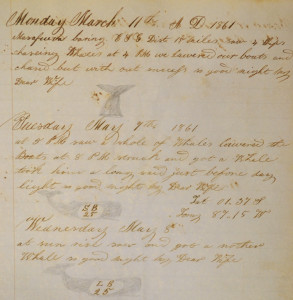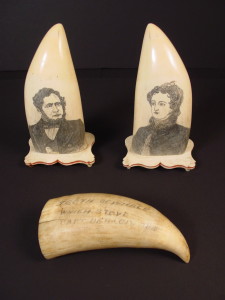Whaling “is a wretched life [of] privations and hardship deprived of friends and society,” John Scott DeBlois (1816-1885) wrote in an 1844 letter to his family in Newport. A notable 19th century whaling ship master whose DeBlois and Lucas ancestors were early Huguenot settlers of Newport, John DeBlois began sailing as a young boy. He served as the 3rd Mate aboard the whaling bark Isabella and as the 1st Mate of the Ann Alexander. Between the two voyages, he married Henrietta Tew of Newport. In 1850, DeBlois was promoted to captain aboard the Ann Alexander. Though his first voyage as commander ended in catastrophe, the experience made him one of the most famous whaling captains of the nineteenth century.
While cruising in the Pacific Ocean on 20 August 1851, the crew of the Ann Alexander spotted a pod of whales. Captain DeBlois ordered the crew to lower whaling boats to begin the hunt. Their attempts ended in disaster, as one of the whales became enraged and destroyed two of the small craft. DeBlois successfully rescued all of the distressed men, and resolved to continue the pursuit from the safety of the Ann Alexander itself. After several hours of chase, the creature turned toward the vessel and rammed its hull. While water rapidly flooded the cabins of the Ann Alexander, DeBlois ordered his crew to repair the remaining boats. Luckily the men were saved on 22 August when they were spotted by the crew of the Nantucket.
Newspaper accounts of the Ann Alexander incident portrayed Captain DeBlois as a hero, and his celebrity grew after the publication of Herman Melville’s Moby Dick. As the novel told the story of a whaling vessel that was sunk by an enraged leviathan, the American public compared John DeBlois to Melville’s fictitious Captain Ahab. It is the inspiration behind Melville’s story that is the focus of the Nathanial Philbrick book and Ron Howard film In The Heart of the Sea.
Undaunted by the misfortune of his first voyage as commander, DeBlois continued his career as a whaling captain. While at sea, he regularly corresponded with his wife Henrietta. A former Newport school teacher, she was an exceptional writer. From 1856 to 1859, Henrietta joined her husband on a whaling voyage aboard the Merlin. She chronicled daily life aboard the vessel in a private journal. The manuscript and several letters exchanged between John and Henrietta are held in the collections of the Newport Historical Society and they offer a window into the personal lives of this famous Newport whaling family.
Above: A c.1910 postcard from the NHS collection.


